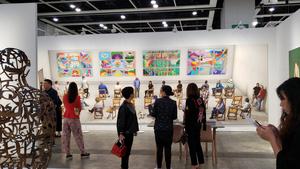Businesses and exhibitors turn to the internet to promote their products and services through online events — a trend that appears likely to continue after the COVID-19 pandemic ends. Pamela Lin reports from Hong Kong.
 (PHOTO PROVIDED TO CHINA DAILY)
(PHOTO PROVIDED TO CHINA DAILY)
The coronavirus pandemic has revolutionized the way people interact, with a profound upshot on major political summits, conferences and expositions.
Unprecedented lockdowns and social distancing measures enacted around the world to contain the spread of the virus have kept people physically apart with a tight lid on public and even religious gatherings, while fueling a boom in digital culture as people and businesses revise ways of interacting.
Globally, billions of citizens are asked to practice social distancing as travel bans and city lockdowns come into force in most countries. Some public and business events like trade fairs, global conferences, exhibitions and social assemblies remain suspended.
For enterprises, staying afloat during the trying times is essential, while keeping in close contact with the public during the pandemic has become a challenge.
“Scrapping or rescheduling large-scale physical events presents a huge challenge for brands — how they can keep themselves effectively engaged with customers and staff,” said Geraldine Chew, chief executive officer for Greater China at Uniplan, a brand experience agency based in Germany.
In Hong Kong — a leading world trade center, logistics hub and a meeting point of East and West — the pandemic’s toll on public and business life is prevalent. Some of the biggest annual crowd-drawing events, including the JMA Hong Kong International Jewelry Show, Hong Kong Arts Festival and the Hong Kong Sevens, could not be held on time.
At least 18 exhibitions, as well as conferences organized by the Hong Kong Trade Development Council (HKTDC) from February to May, have been put on hold.
This leaves businesses and exhibitors with little choice but to turn to the internet, which has taken on a more significant role than ever as a bridge across the physical divide. Brands across the region have become more open to opportunities, including creating digital events, Chew said.
Businesses have blazed new trails to reach out to people who are glued to their cellphones and laptops. Instead of canceling or putting off public events, organizations have been rolling out virtual career fairs, trade and art fairs, streaming fitness classes, and even “cloud clubbing” to link up with the distant public.
With more than a half-century’s experience in organizing international exhibitions and conferences to promote Hong Kong’s trade, the HKTDC swiftly responded by launching a monthlong Spring Virtual Expo from April 1.
The monthlong Spring Virtual Expo drew 1.4 million buyers worldwide to visit and check out the products. Because of the ongoing pandemic, the HKTDC decided to have a digital show every quarter this year.
Benjamin Chau Kai-leung, the HKTDC’s deputy executive director, told China Daily the Spring Virtual Expo features suppliers who had planned to join the four exhibitions originally scheduled for April — a traditional peak sourcing season.
“We had earlier conducted a survey which showed that for Hong Kong’s small and medium enterprises, 30 to 40 percent of their business contracts come from trade fairs and exhibitions,” Chau said. Undoubtedly, canceling these trade fairs could mean huge losses for SMEs.
Hong Kong is renowned as a purchasing center for global buyers. Despite the pandemic, which has kept buyers from coming to trade fairs, the procurement needs of buyers worldwide are still running up. The HKTDC thus planned to hold virtual meetings to boost communication between buyers and suppliers, Chau said. It continued to organize similar trade fairs in May and June although the products to be exhibited will be changed accordingly.
After Art Basel Hong Kong — the city’s annual flagship art fair — was called off in March as the outbreak increased in ferocity, the premier art show launched its first-ever online exhibition, hoping to provide galleries, dealers and collectors a whole new experience.
The weeklong online exhibition drew more than 250,000 visitors from around the world. As much as 235 galleries showed off some 2,100 pieces of art pieces worth US$270 million. Last year, Art Basel Hong Kong attracted just 88,000 art lovers and dealers globally.
Virtual or physical?
Although online exhibitions are more capable of reaching out to a larger group of collectors than physical ones, it’s still debatable whether it’s as effective as a physical art fair in securing actual art deals.
Besides fairs, fitness studios, which are also considered to be high-risk avenues for coronavirus transmission, also shut down to curb the virus outbreak. ClassPass — a US-based company that provides access to different studios worldwide — launched livestream classes with 500 studios offering fitness classes during the outbreak.
The platform said the number of studios offering livestream classes tripled in one week. One-third of the studios have received reservations through ClassPass.
It seems inevitable that digital tools will become one of the few options to maintain ties between businesses and audiences during the pandemic. But can they seize the opportunity and see explosive growth during the pandemic, or are they just a flash in the pan?
Some enterprises said they’ll adopt a combination of physical and digital experiences in future events, while others that used to immerse themselves in a single traditional way of communication have started rethinking the process of integrating digital elements to connect with the public.
ClassPass believes that digital workouts will become a regular part of some routines and that people will opt for some combination of in-person and online classes moving forward.
Cyberport — Hong Kong’s sprawling digital community in Pok Fu Lam — held a virtual job fair on April 4 that saw both the number of recruiters and job seekers who participated in the fair break records. Cyberport said it’s considering holding a physical and virtual job fair together next year.
The HKTDC pointed out that manufacturers could not purely rely on physical trade exhibitions to get business, and the pandemic might be a turning point for industries to innovate and build up relations with potential customers.
Some proactive companies are using the opportunity to innovate and ameliorate the situation, Chau said. The HKTDC has also held a series of e-commerce webinars for SMEs to expand knowledge of e-commerce with the help of representatives from Google.
Chau said after the first webinar in March, more than 80 percent of the 350 participants responded that the event offered them practical and useful information. The seminar series will last six months, covering online promotion strategies and the precautions needed when taking online orders.
It’s a certainty that companies will never be the same again after the pandemic. Brand experience specialist Uniplan suggested that companies evaluate what an event experience is instead of merely pursuing digital content.
“We inspire clients and partners to do something different, but you can’t bring a physical event and just film it and carry the same experience with your audience. You need to reconsider lots of things,” Chew said.
She believes that Asia can be at the forefront in creating hybrid events, as the region has a very receptive and tech savvy audiences. They’re very responsive to online experiences, and it represents ideal opportunities for brands to tap into.
In China, where the livestream industry is thriving and generates a huge capital market, Chew said that with a large-scale ecosystem where platforms and audiences are more connected with solid digital infrastructure, the industry will continue to boom.
“What we could see is that online elements will eventually become a more permanent part of the exponential landscape, working in tandem with traditional events and exhibitions,” she said.
Uniplan set up a broadcast studio in Hong Kong recently to bring its expertise in broadcasting and livestreaming to clients who are looking for small to medium-scale livestream and recorded-content requirements. The 60 square meter studio can hold conferences, small product launches, virtual museums and mini concerts.
Chew said the agency had intended to build up a studio before the pandemic, which turned out to be a catalyst for the company to start it earlier.
“With audiences now isolated, we believe it’s not the time to go silent. We have to entertain our audiences and visitors,” she said, adding that the public needs brands to keep in touch.
Uniplan has been helping its clients in livestreaming, using its knowledge in broadcast and content creation to deliver effective plans that can help keep its audiences engaged and hooked up in the coming months, Chew said.
Contact the writer at pamelalin@chinadailyhk.com



